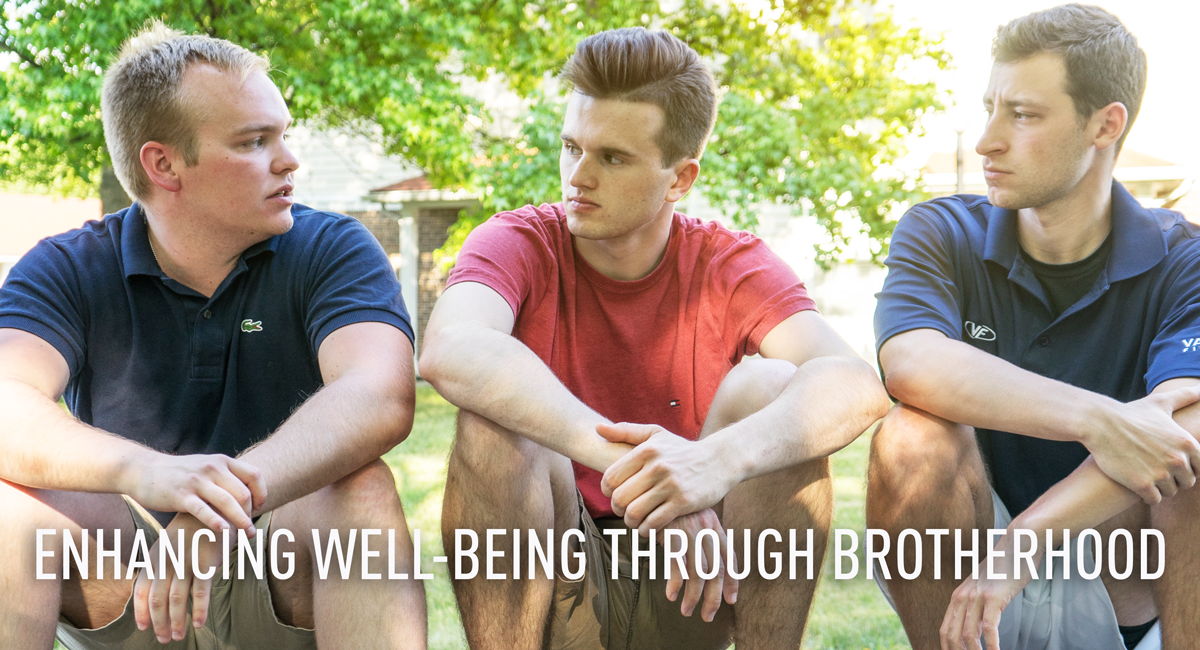The Power of Connection

When I reflect on my time as an undergraduate, one powerful theme always comes to mind: brotherhood. Whether it was connecting with my fellow brothers, sharing meals in the dining hall, celebrating becoming a Hugh Shields Chapter at the Southern Division Conference, or shedding tears over young heartbreak, bonding with my brothers was a critical aspect of my college experience.
The need to connect has evolutionary beginnings and is fundamental to who we are as human beings. Historically, if we were left out of the pack, we were less likely to survive. Today being connected continues to have large benefits for survival. For example, having strong social bonds decreases the risk of heart attack and stroke (Baker, 2017). Connecting with other people also increases happiness. Our brains are well aware of these effects and act accordingly. When we feel disconnected, the same part of our brain that processes physical pain becomes more active, sending us warning signals that we need to connect. Even though warning signs no longer mean immediate life or death today, as it often did in pre-historic times, when we do feel left out or lonely, our brain sends us signals that we are vulnerable and need a connection to protect ourselves (Esfahani Smith, 2013; Johnson, 2013; Lieberman, 2013).
This innate response to disconnection can lead to a variety of symptoms that I see as a mental health professional. Racing thoughts of fear and worry about what other people think about you, feeling tense around other people, acting in ways you believe will maximize acceptance from others (rather than being your authentic self), and worrying about grades, internships and future career decisions all can have a relational component. These presentations and complex internal experiences often manifest as feelings of sadness, anxiety, disconnection, and exhaustion. In my experience, underneath these symptoms is often the deep-seated question: “Am I enough?”
Going back to the phenomenon of acting how we think others want us to act, I often hear some form of the following sentiment in my clinical work: “I have friends, I’m around people all of the time, yet I feel lonely.” Regrettably, this experience frequently stems from an unfortunate irony: we often show our best selves, our smiling, perfect, have-it-all together selves, to be accepted by other people; however, we tend to feel most connected to others when we can show them our imperfections (Brown, 2010).
Yes, sharing some of our happiest moments with our fellow brothers, such as graduating from college or landing an internship we’ve been dreaming of, helps build important connections, but we also build connections when we’re beautifully imperfect. When we cry over the end of a relationship (and yes, as much as we may not like to admit it, men do cry) or feel sad that we didn’t land that job or internship, or when we feel overwhelmed by our academic load, sharing this with our brothers helps us feel less alone and more connected. Show me a chapter that is vulnerable with each other in this way, and I’ll show you strong bonds of brotherhood.
But, how do you encourage this acceptance of vulnerability? The culture of masculinity in the United States certainly does not help it. Our values truth, courage, faith and power can be used to enhance brotherhood by accepting vulnerability. Can we have the courage to be real with each other and speak our truths to our fellow brothers? And can we have faith that our brothers will respond with compassion? Being able to answer “yes” to these questions will enhance our power to connect, and even small changes can contribute to this sense of purpose and connection. Over the past year, I have had the privilege of working with the Delta Tau Delta Chapter at Duke University. In my collaboration with this chapter, we established a new norm in which Fraternity members ask each other about their best and worst moments of the past week and discuss a “preview” of a big event coming up, such as a job interview, when they see each other on campus. This new communication between members has encouraged Fraternity members to be more vulnerable with each other, helping to make an already strong brotherhood even stronger.
"The more real we are with one another as brothers, the more we will be able to talk about very vulnerable topics. In considering vulnerable topics, few topics can make us feel more vulnerable than discussing suicide."
Before we discuss ways to engage in suicide prevention, I want to begin by combating a prominent myth about asking someone if they are suicidal: that it will put the idea in his/her head. This is simply not true. However, asking someone who appears withdrawn, to have undergone a significant mood change (including increased sadness and/ or anger), engaging in reckless behaviors, and/or who has just had a significant relationship end if s/he is suicidal can be a relief for somebody who is considering suicide. Finally, somebody has named the elephant in the room. And being very direct about the question can encourage an open dialogue about an often closed off topic.
By direct, I mean asking, “Have you been having thoughts of killing yourself and/or how close have you come to hurting yourself?” While this question can provide relief to someone who may be struggling with thoughts of suicide, it is also crucial to remember that you should not bear sole responsibility for the response to this question. Rather, if someone you know is in distress and/or suicidal, you should contact a professional directly and/or encourage him to contact a professional or a crisis intervention service referenced below.
You should also stay with any brother about whom you are seriously concerned until he has been connected with the appropriate professional support. Please note that, to best support a fellow brother during a conversation about suicide or another difficult topic, it is very important to listen in a non-judgemental manner and to empathize with his experience, rather than trying to fix things.
I would be remiss if I did not also name a quick and effective suicide prevention method that all chapters can engage in: removing firearms from fraternity houses. Although women attempt suicide more often than men, men commit suicide in greater numbers, possibly because they tend to use more lethal methods, such as firearms (Mays, 2014).
In order to diminish the stigma surrounding mental health issues on campus and to increase our individual and collective well-being, I encourage chapters to be open about mental health and emotional well-being on a consistent basis. Invite a staff member from your university’s counseling center to speak at a chapter meeting to address difficult topics such as academic stress, anxiety about the future, relationship distress, and/or times when brothers have not felt like themselves and may exhibit signs of depression.
Doing so will encourage wellness and expose your chapter’s members to the resources at their disposal so that the university counseling center isn’t just a place to go to as a last resort. Consider engaging in difficult discussions as a chapter, or with brothers in your chapter with whom you are particularly close, as this not only improves overall wellness but will also enhance the already amazing brotherhood that we all share.
I would like to direct a message to my fellow alumni. Staying in touch is difficult. Relationships with significant others, kids, and work all take up a great deal of our time. However, maintaining friendships are not just important for our emotional health and happiness, it could also be a matter of life or death for our physical health.
This is not an overstatement. Employing data collected from 3.5 million people over 35 years, a study from Brigham Young University found that people who fall into the categories of isolation and loneliness see their risk of early death rise between 26 and 32 percent (Baker, 2017).
How do we combat the absence of male friendships that becomes all too common as we enter our 30s, 40s, and beyond? Being connected and involved with Delta Tau Delta alumni networks in your area is a great place to start! In addition, people are more likely to create and maintain friendships if they have a particular activity and/or routine that leads to spending time with friends (or other people in general) on a regular basis (Baker, 2017). Therefore, I encourage brothers to seek out scheduled activities, such as a softball league, a running group, a poker club, or any other activity of interest, to spend dedicated time with others. I would also encourage alumni to plan a monthly day or time to talk over the phone with brothers who are not in their area and to consider planning a yearly weekend trip with brothers from your chapter and/or who live in your area. Doing so is likely to increase your feelings of happiness, connection, and brotherhood.

Greg Welikson (American University, 2006)
Since graduating from American University Welikson got married, became a father and earned a Ph.D. in psychology. Working at university counseling centers at the City College of New York, Barnard College and Duke University, most of his professional life has been devoted to helping young adults through difficult times. Through this work, as well as in his personal life, he has become convinced that brotherhood and connection can transform lives.
If someone you know is in distress and/or suicidal, you should contact a professional directly and/or encourage the individual to contact a professional or one of the following crisis intervention services:
- National Suicide Prevention Lifeline: 1-800-273-8255
- 911
Also, college students can and should make use of the following resources:
- Your university’s counseling center
- Your resident assistant
- www.ulifeline.org (online resource for college mental health)
References/Resources Baker, B. (March 9, 2017). The biggest threat facing middle-aged men isn’t smoking or obesity. It’s loneliness. Boston Globe Magazine. Retrieved from https://www.bostonglobe.com/ magazine/2017/03/09/the-biggest-threat-facing middle-age-men-isn-smoking-obesity-loneliness/ k6saC9FnnHQCUbf5mJ8okL/story.html Brown, B. (2010). The gifts of imperfection: Let go of who you think you’re supposed to be and embrace who you are. Center City, MN: Hazelden. Esfahni Smith, E. (October 29, 2013). Social connection makes a better brain. The Atlantic. Retrieved from https://www.theatlantic.com/ health/archive/2013/10/social-connection- makes a-better-brain/280934/ Johnson, S. (2013). Love Sense: The revolutionary new science of romantic relationships. New York: Little, Brown and Company. Lieberman, M. D. (2013). Social: Why our brains are wired to connect. New York: Crown. Mays, D. (2014). Suicide: Risk assessment and risk management, 14th Edition
